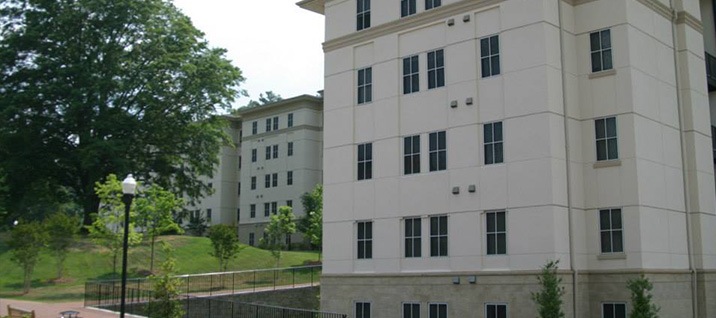When Raegan Allen (23C) and her roommates returned to the Undergraduate Residential Center (URC) at Clairmont Campus after fall break, they discovered an unwelcome guest in their apartment: extensive mold growing in their rooms, common spaces and personal belongings.
“We first found that it was growing on one of my roommate’s dresses and my other roommate found it growing all over her trash can,” Allen said. “We started to look all over the apartment and it turns out it was on top of our TV stand, on our carpets, underneath the beds and bathroom cabinets. There was mold everywhere else other than the kitchen.”
With the alarming amount of “vomit-inducing” mold, Allen said she and her roommates called Campus Services’ emergency contact number. They were told that mold infestation is considered a non-emergency standard work order for the maintenance team, so they submitted a work order that day.

Undergraduate Residential Center. Photo courtesy of Emory University
Allen was one of numerous students that voiced similar concerns about mold infestation.
Laura Diamond, assistant vice president of Communications and Marketing, said in a Nov. 30 email to the Wheel that “during the fall semester, Emory’s Facilities Management received about 90 mold-related work requests for the Clairmont Campus.”
It took two days for maintenance staff to visit Allen’s apartment to gather data on the infestation, after which they informed the residents that they might have to wait for a deep cleaning. Before and after the first visit from maintenance staff, Allen said she and her roommates repeatedly made calls and drafted emails because they were not receiving updates on the work order status.
“Pretty much everytime we called, the person who we spoke to said ‘I’ll check on that for you’ and then we wouldn’t hear anything for days,” Allen explained. “We felt like no one was listening to us … We were just pulling teeth to get people to even come look.”
Diamond said “Emory’s response to potential mold begins immediately, with the University conducting preliminary inspections within 24 hours of receiving a work order. Depending on the situation, the entire process of investigation, mold remediation and clean-up may take up to two weeks to complete.”
Cleanliness was not the only reason why Allen and her roommates wanted immediate help. They reported experiencing mold exposure health symptoms such as congestion that resembled the common cold as well as fungal sinus infections. Two of Allen’s roommates who are allergic to mold “definitely had a hard time breathing” and Allen herself experienced headaches.
On Oct. 20, eight days after they first submitted the work order, Allen and her roommates were told by Campus Services to move their belongings for a deep cleaning of the apartment the next morning, which they finally received on time. Allen felt that this was a “short notice.”
Similarly, Catherine Minyard (23C), who also lives in URC, was notified at 5 a.m. on the day of the maintenance staff’s visit, which she said was not enough time for her to plan accordingly. The staff visited Minyard and her roommates’ apartment multiple times for inspections and cleanings, but for several visits, Minyard could not be there because the appointment time was unclear, she said.
Because Minyard and her roommates were not prepared to put their belongings away, the staff could not proceed with the cleaning.
Minyard said she wished she would have received accurate notices prior to the visits in order for her to prepare the apartment for cleaning and communicate with the staff about the progress.
”The problem is that it’s confusing,” Minyard said. “I never know how much communication I’m going to get about what they’re doing or when they’ve done it.”
Students at the URC were not the only ones who said they experienced mold infestation concerns.
Abri Rochte (24B), who lives in Casa Émory, initially suspected possible mold infestation in the house after she learned that one of her housemates could not move in on time this semester because of mold growing in her room. Rochte and several other residents saw things growing on their rooms’ walls and ceilings, but were unsure what exactly it was.
When Rochte found out that several other residents at Casa Émory had also been experiencing recurring illnesses, like herself, she suggested that the house get checked for mold infestation.
“For two months, I’ve had an on and off cough, asthma symptoms and sinus infection,” Rochte said. “Three other people in the house for sure have been going through respiratory sickness too. I’ve been to the doctor and they didn’t think it was a virus.”
Rochte said her ongoing sickness has caused her to miss classes, hindering her academic performance.
“That’s really bothered me because my grades in some classes are lower than I would like,” Rochte said. “Specifically with my Spanish class, which I’m supposed to go to, living in Casa Émory, I haven’t been able to go because I lost my voice for two weeks. I literally lost a month of Spanish class.”
Rochte first contacted Sussy Vasquez Perez, assistant director of Facilities and Operations for Housing, and Daniel Zozaya Brown, interim complex director, for guidance on the potential mold infestation. A week and half later, staff from Campus Services and the Environmental Health & Safety Office visited Casa Émory at separate times to conduct the investigation, Rochte said.
Although Rochte wanted an investigation of the entire house, including all the rooms and common spaces, the staff checked six rooms upstairs where residents saw potential mold on walls and ceilings. A week after the investigation, Vasquez Perez informed Casa residents that the investigations indicated no mold infestation aside from one room.
“They said that there was mold in one of the rooms that they did clean [afterwards], and essentially nowhere else, including the rooms where there is stuff on the ceiling,” Rochte said.
Rochte explained that the investigation staff said that they did not know what was growing on the ceilings and walls, but that they thought it should be fine.
Vasquez Perez directed the Wheel’s request for comment to Diamond.
Mold infestation was not the first concern of living quality at Casa Émory, Rochte said. When Casa residents first moved in in August, after the house was vacant for a year and half, they faced dirty rooms and common spaces as well as various maintenance issues with heaters, bathrooms and appliances.
Students said they were especially frustrated with the poor conditions and inefficient communication given how expensive University housing is.
“We have singles in the house so we pay an extra $300 or so and the cost includes regular cleaning of the spaces,” Rochte said. “I feel like we don’t get that but [are still] paying more money. I love the community, we’re really close and we have so much fun. Otherwise, I wouldn’t live in an environment like this.”
Allen further explained that she “was not angry” about the infestation and lack of clarity on updates, but wished she and her roommates could have been thoroughly informed throughout the process.
“I know that it must have been stressful for those who work in maintenance as well because so many people are having problems with mold …, but it would’ve been nice to know that someone was actually advocating for us and working on our case rather than deal with silence,” she said.
Rochte also said she hoped that the University’s housing department and Campus Services could provide a better living condition for students as well as effective communication on raised concerns.
“I wish they would’ve fixed the things that needed to be fixed before we moved in and cleaned the house thoroughly before we moved in,” she stated. “I also wish they took a lot of our requests more seriously, investigated thoroughly and presented us with all of the information of what’s happening. I feel like there’s a lack of transparency surrounding it.”
Tiffany Namkung (she/her) (24C) is from San Diego, California, majoring in sociology and film and media. Outside of the Wheel, she’s been a part of several production teams. In her free time, you can find her bothering her cats, crying over cat videos and chasing cats on campus.






